
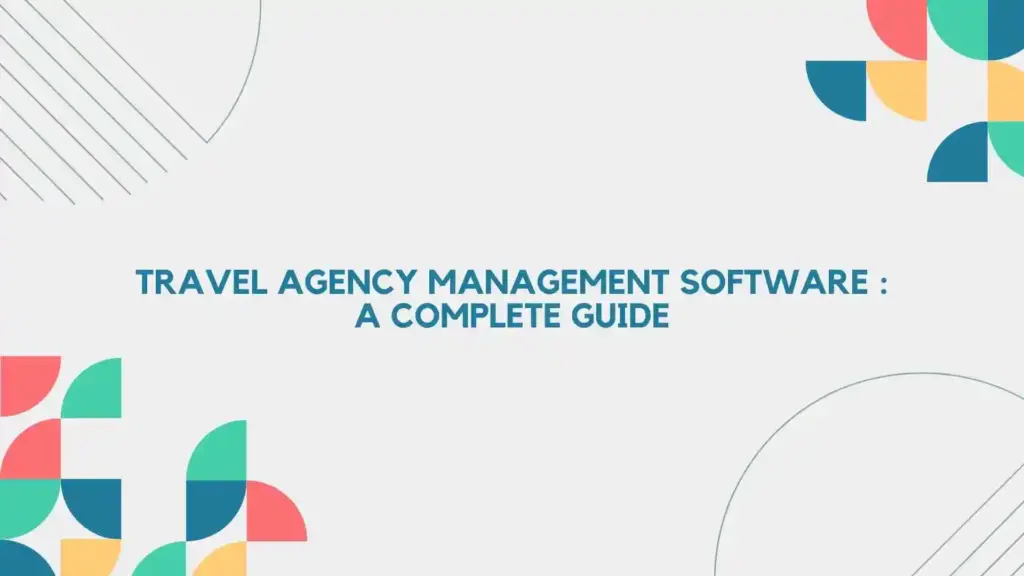
In today’s rapidly evolving travel industry, managing a travel agency efficiently requires sophisticated software solutions tailored to its unique needs. With the myriad of options available, it’s essential to understand the must-have features that can streamline operations, enhance customer experience, and drive growth. Let’s delve into the top 10 features every travel agency management software must possess to thrive in this dynamic landscape.
Embarking on your journey with travel agency management software? This beginner’s guide provides essential insights to kickstart your experience and make informed decisions!
As you step into the realm of travel agency management, navigating through the array of software options can be overwhelming. This beginner’s guide aims to demystify the process and equip you with the knowledge needed to embark on your software journey confidently. Whether you’re a novice or seasoned professional, understanding the basics is key to optimizing your agency’s operations and enhancing customer satisfaction.
Travel agency management software is a specialized tool designed to streamline various aspects of travel agency operations, including booking management, itinerary planning, customer relationship management (CRM), accounting, and reporting.
Booking Management: Efficiently manage bookings, reservations, and ticketing processes.
Itinerary Planning: Create detailed itineraries for clients, including flights, accommodations, and activities.
CRM: Maintain a database of client information, preferences, and booking history to personalize service delivery.
Accounting: Track financial transactions, invoices, and payments seamlessly.
Reporting: Generate insightful reports on sales, revenue, and performance metrics to inform strategic decision-making.
Identify Your Needs
Before diving into software selection, assess your agency’s specific requirements and pain points. Are you looking to streamline booking processes, improve customer service, or enhance financial management?
Budget Constraints
Consider your budgetary constraints and evaluate the cost-effectiveness of different software solutions. While some platforms offer comprehensive features at a higher price point, others may provide basic functionality at a more affordable rate.
User-Friendly Interface
Opt for software with an intuitive interface that is easy to navigate and user-friendly. A steep learning curve can hinder adoption and productivity, particularly for beginners.
Scalability
Choose a software solution that can grow with your agency. Scalability is essential to accommodate increasing booking volumes and expanding business operations over time.
Customer Support
Prioritize software providers that offer reliable customer support and training resources. Prompt assistance is crucial, especially for beginners navigating unfamiliar territory.
Yes, many software providers offer solutions tailored to the needs and budgets of small to medium-sized travel agencies. Look for platforms that offer scalable pricing plans and essential features to support your operations.
Yes, most modern software solutions offer integration capabilities with third-party tools and platforms, such as booking engines, payment gateways, and marketing automation software.
The implementation timeline can vary depending on factors such as the complexity of your agency’s operations, the selected software solution, and the availability of resources for training and data migration. However, many providers offer guided implementation processes to streamline the transition.
Some software solutions for travel agency offer marketing automation features, such as email campaigns, lead management, and customer segmentation, to support marketing efforts and drive customer acquisition.
Reputable software providers implement robust security measures, such as data encryption, secure authentication protocols, and regular security updates, to safeguard sensitive information against unauthorized access and data breaches.
Embarking on your journey with travel agency management software can be both exciting and daunting for beginners. By understanding the fundamentals of travel agency operations, evaluating key considerations for software selection, and leveraging the insights shared in this guide, you can navigate the landscape with confidence and set your agency up for success in the digital age.
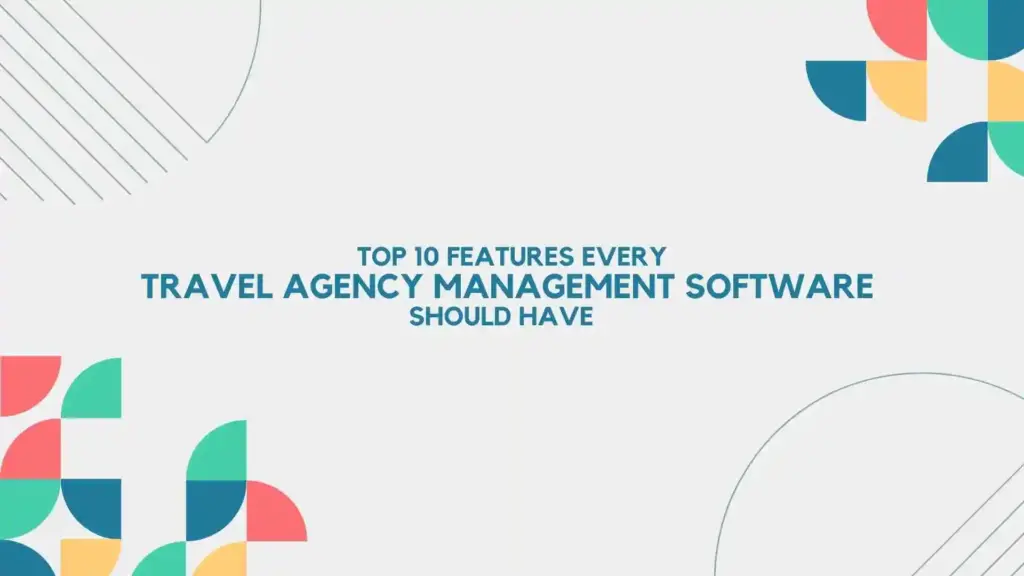
Efficiently managing bookings is the backbone of any travel agency. An integrated booking system allows seamless reservation management across multiple platforms, including flights, accommodations, tours, and transportation services. This feature not only simplifies the booking process for agents but also ensures accuracy and eliminates the risk of overbooking.
A robust Travel agency CRM software is indispensable for building and nurturing customer relationships. From storing client information and preferences to tracking interactions and communication history, a comprehensive CRM empowers travel agents to deliver personalized services tailored to each customer’s needs.
In a competitive market, dynamic pricing tools enable travel agencies to stay agile and responsive to fluctuating demand and market conditions. These tools leverage real-time data and algorithms to adjust prices dynamically, maximizing revenue while offering competitive rates to customers.
Efficient inventory management is critical for ensuring that travel agencies have access to up-to-date information on available services and products. From managing room allocations to tracking ticket availability, a robust inventory management system enables agencies to optimize resource utilization and minimize the risk of overselling.
Travel agency software requires multi-channel distribution to expand reach, increase sales across platforms like OTAs, direct bookings, and brick-and-mortar outlets, fueling revenue growth.
Data-driven insights are invaluable for making informed business decisions and optimizing performance. Reporting and analytics tools provide travel agencies with actionable intelligence on sales trends, customer behavior, and operational efficiency, enabling them to identify opportunities for improvement and strategic growth.
In an increasingly mobile-centric world, travel agents need access to critical information and functionalities on the go. Mobile compatibility ensures that agents can manage bookings, communicate with clients, and access essential tools from their smartphones or tablets, enhancing productivity and flexibility.
Streamlining workflows and automating repetitive tasks can significantly improve operational efficiency and productivity. Travel agency management software with automated workflow capabilities enables agents to focus on high-value tasks while reducing errors and manual intervention in routine processes.
Maintaining brand consistency and identity is essential for building trust and recognition in the marketplace. Travel agency management software should offer customizable branding options, allowing agencies to tailor the interface, communications, and marketing materials to reflect their unique brand personality and values.
In the travel industry, where emergencies and unexpected issues can arise at any time, reliable customer support is paramount. Software vendors must provide 24/7 customer support to address technical issues, provide assistance, and ensure uninterrupted service delivery, fostering trust and loyalty among agency clients.
A strong travel agency software should feature integrated booking, CRM, dynamic pricing, inventory management, multi-channel distribution, reporting, mobile compatibility, automated workflows, branding options, and 24/7 customer support.
Dynamic pricing enables travel agencies to adjust prices in real-time, maximizing revenue and competitiveness based on demand and market conditions.
Mobile compatibility enables travel agents to access essential tools and information on the go, enhancing productivity and flexibility in serving clients.
Reporting and analytics provide valuable insights into sales trends, customer behavior, and operational efficiency, empowering agencies to make data-driven decisions and drive strategic growth.
Customizable branding allows travel agencies to maintain brand consistency and identity across their software interface, communications, and marketing materials, fostering trust and recognition among clients.
24/7 customer support ensures timely assistance for travel agencies, enhancing client satisfaction and loyalty.
Are you overwhelmed with the options for travel agency management software? Learn how to choose the best one for your business needs in this detailed guide.
In the fast-paced world of travel agency management, having the right software can make all the difference in streamlining operations, enhancing customer experiences, and boosting overall efficiency. However, with a plethora of options available in the market, selecting the best travel agency management software for your business can be a daunting task. Fear not! This comprehensive guide will walk you through the essential factors to consider, helping you make an informed decision tailored to your specific requirements.

Before diving into the vast ocean of travel agency management software solutions, it’s crucial to assess your business needs comprehensively. Ask yourself:
Understanding your business requirements will serve as a compass, guiding you towards the most suitable software solution.
With a clear understanding of your business needs, it’s time to research available options in the market. Consider the following aspects :
Choose software with an intuitive interface that facilitates easy navigation and minimizes the learning curve for your team.
Opt for a solution that can grow with your business, accommodating increased workload and expanding operations seamlessly.
Select software that offers robust integration capabilities, allowing seamless connectivity with third-party applications such as accounting software, CRM systems, and booking platforms.
In today’s mobile-centric landscape, ensure the software provides mobile accessibility, enabling your team to manage operations on the go.
Prioritize software vendors that offer reliable customer support, including timely assistance, troubleshooting, and training resources.
As you narrow down your options, it’s essential to evaluate the key features offered by each software solution. Consider the following:
Efficient booking management capabilities are vital for handling reservations, cancellations, and modifications seamlessly.
Look for software that offers robust inventory management features, allowing you to track available resources, such as flights, accommodations, and transportation options.
Choose a solution with secure payment processing capabilities, supporting multiple payment gateways and currencies to cater to diverse clientele.
Opt for software that provides comprehensive reporting and analytics tools, enabling you to gain valuable insights into your business performance and make data-driven decisions.
Streamline repetitive tasks and workflows with automation features, freeing up valuable time for your team to focus on delivering exceptional customer service.
After thorough research and evaluation, it’s time to make the final decision. Consider factors such as :
Choose the software solution that aligns most closely with your business needs and objectives.
To determine the right software, assess your business needs, research available options, evaluate key features, and consider factors such as user-friendliness, scalability, integration capabilities, mobile accessibility, and customer support.
Essential features include booking management, inventory management, payment processing, reporting and analytics, and automation capabilities.
Many software solutions offer customization options to tailor the platform to your agency’s unique needs.
Yes, reliable customer support is crucial for timely assistance, troubleshooting, and training resources to ensure smooth operations.
Prioritize software solutions with robust integration capabilities and compatibility with your existing systems to ensure seamless connectivity and data synchronization.
Besides features and functionalities, consider factors such as cost-effectiveness, user feedback and reviews, vendor reputation, and reliability.
Looking to implement travel agency management software successfully? This ultimate guide provides expert tips and insights to streamline the process and maximize efficiency.
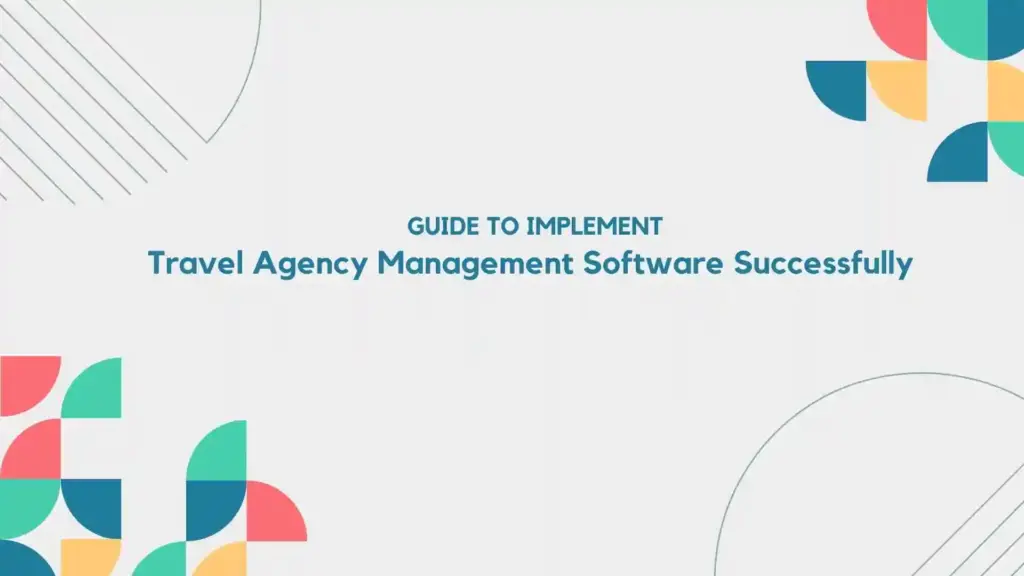
Implementing travel agency management software can revolutionize your business operations, enhancing efficiency, and improving customer satisfaction. However, the process can be daunting without proper planning and execution. In this comprehensive guide, we’ll walk you through the steps to successfully implement travel agency management software, ensuring a seamless transition and optimal utilization of resources.
Before diving into implementation, it’s essential to assess your business needs thoroughly. Identify pain points, inefficiencies, and areas for improvement within your current operations. Consider factors such as:
Understanding your business requirements will guide the selection and customization of the software solution to best fit your needs.
With a clear understanding of your business needs, research available software options in the market. Look for solutions specifically designed for travel agencies, offering features such as:
Efficiently handle reservations, cancellations, and modifications with robust booking management capabilities.
Track and manage inventory, including flights, accommodations, and transportation options, to ensure availability and optimize resource utilization.
Enhance customer relationships and loyalty with a CRM module that tracks interactions, preferences, and feedback.
Streamline financial processes, including invoicing, payments, and reporting, to ensure accuracy and compliance.
Gain valuable insights into your business performance with comprehensive reporting and analytics tools, enabling data-driven decision-making.
once you’ve selected the software solution that best meets your needs, it’s time to plan and prepare for implementation. Create a detailed implementation plan that outlines:
Engage key stakeholders and ensure buy-in from all departments to facilitate a smooth transition.
Execute the implementation plan according to the established timeline, ensuring minimal disruption to daily operations. Provide comprehensive training to staff members on how to use the new software effectively. Offer ongoing support and resources to address any questions or concerns that arise during the transition period.
Once the software is up and running, continuously monitor its performance and gather feedback from users. Identify areas for optimization and fine-tuning to maximize the benefits of the software solution. Regularly review and update processes to align with best practices and evolving business needs.
Successfully implementing travel agency management software requires careful planning, thorough research, and effective execution. By assessing your business needs, selecting the right software solution, planning meticulously, and providing comprehensive training and support, you can streamline operations, enhance efficiency, and position your travel agency for success in a competitive market.
Learn how Travel Agency A skyrocketed its bookings by 50% through effective management software. Discover the strategies, insights, and tools that led to this remarkable growth.
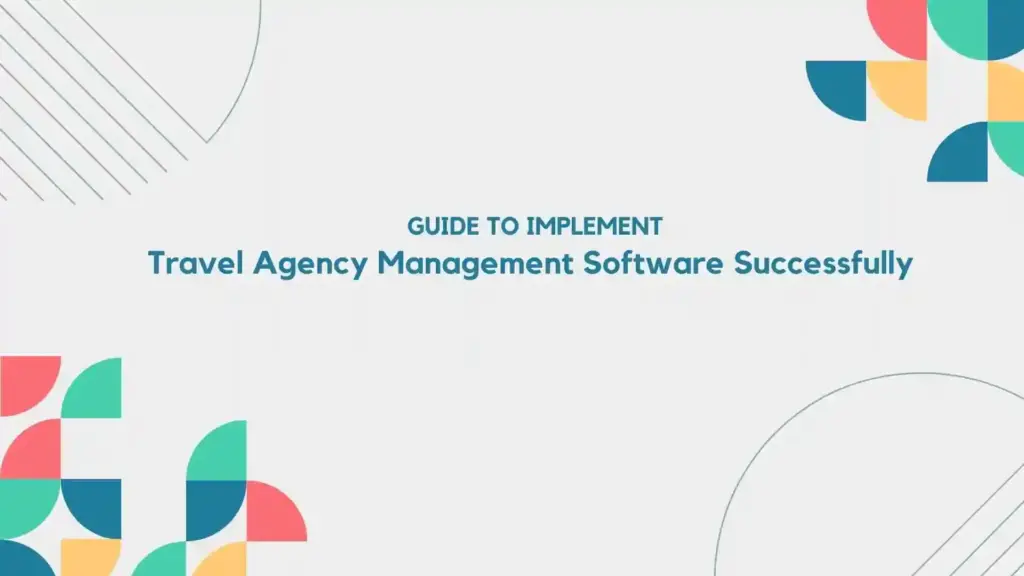
In an ever-evolving travel industry, maximizing efficiency and enhancing customer experience are paramount for success. Travel Agency A’s remarkable journey showcases how embracing innovative management software can lead to unprecedented growth. This case study delves into the strategies and outcomes that propelled Travel Agency A to increase its bookings by an impressive 50%.
In a highly competitive landscape, traditional approaches to managing bookings and customer interactions often fall short. Travel Agency A recognized the need to streamline its operations and enhance customer satisfaction to stay ahead in the market.
Travel Agency A made a strategic decision to invest in cutting-edge management software tailored to the travel industry. This move aimed to automate processes, improve data analysis, and provide personalized experiences for customers.
The implementation of management software revolutionized how Travel Agency A handled bookings. From itinerary planning to payment processing, automation streamlined operations, reducing errors, and saving valuable time.
Management software empowered Travel Agency A to deliver personalized experiences to its customers. By leveraging data insights, the agency offered tailored recommendations, special deals, and timely notifications, fostering deeper engagement and loyalty.
Travel Agency A prioritized data analysis to drive strategic decision-making. By harnessing the power of analytics provided by management software, the agency gained valuable insights into customer preferences, market trends, and booking patterns.
Flexibility and agility were central to Travel Agency A’s success. The agency closely monitored market trends and swiftly adapted its strategies to meet evolving customer demands, ensuring relevance and competitiveness in the dynamic travel landscape.
Recognizing the importance of skilled personnel in delivering exceptional service, Travel Agency A invested in comprehensive training programs for its staff. Equipped with in-depth knowledge of the management software and industry best practices, employees were empowered to provide superior customer support.
The integration of management software enabled Travel Agency A to achieve unprecedented efficiency and growth. By automating tasks, optimizing operations, and enhancing customer experiences, the agency witnessed a remarkable 50% increase in bookings within a short timeframe.
Beyond the tangible results, Travel Agency A fostered lasting relationships with its customers. Through personalized interactions, attentive service, and seamless booking experiences, the agency earned trust and loyalty, ensuring sustainable growth and long-term success.
Travel Agency A began noticing positive outcomes within the first few months of implementing the management software. However, significant growth, such as the 50% increase in bookings, was achieved over the course of a year.
The management software offered a range of features tailored to the needs of the travel industry, including automated booking processes, data analytics tools, and customer relationship management functionalities.
While the transition to management software presented some initial challenges, such as staff training and system integration, Travel Agency A successfully navigated these hurdles with proactive planning and support from the software provider.
Travel & expense Management software allowed Travel Agency A to provide personalized recommendations, efficient booking processes, and timely communication, resulting in enhanced customer satisfaction and loyalty.
While the specific needs of travel agencies may vary, management software can be tailored to accommodate different business models and sizes. It’s essential for agencies to assess their requirements and select a solution that aligns with their goals and objectives.
Travel Agency A advises other agencies to thoroughly research available options, prioritize staff training and support, and set clear objectives for implementing management software. Additionally, maintaining open communication with the software provider is key to addressing any challenges or concerns that may arise.
Travel Agency A’s remarkable journey exemplifies the transformative impact of management software on business growth and customer satisfaction in the travel industry. By embracing innovation, leveraging data insights, and prioritizing customer experience, the agency achieved remarkable results, setting a precedent for success in the competitive landscape.
Learn about the 5 common mistakes to avoid when using travel agency management software to ensure smooth operations and maximize efficiency. Get expert insights and tips to optimize your software usage.
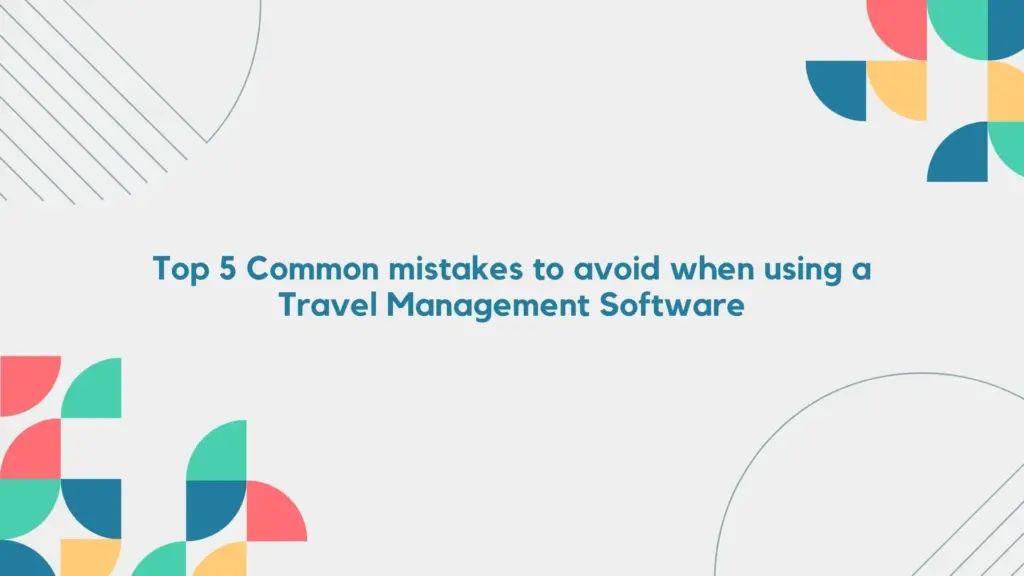
In the dynamic world of travel agency management, leveraging software solutions is key to staying competitive and efficient. However, pitfalls abound, and understanding the common mistakes to avoid can be the difference between streamlined operations and costly errors. This comprehensive guide delves into the nuances of travel agency management software, highlighting five critical mistakes to steer clear of for optimal performance and success.
Modern travel agencies rely heavily on management software to handle bookings, streamline communication, and manage customer data. However, the effectiveness of these tools hinges on how well they are utilized. Let’s explore the key factors that contribute to maximizing the benefits of travel agency management software.
Automation is a cornerstone of efficient operations in the travel industry. Utilizing software capabilities to automate routine tasks such as booking confirmations, itinerary generation, and invoicing can significantly boost productivity and minimize errors.
Travel agency management software often interfaces with various other tools and platforms. Ensuring seamless integration across these systems is crucial for maintaining data integrity and facilitating smooth workflows.
Investing in comprehensive training for staff members is essential for harnessing the full potential of management software. Adequate support structures should also be in place to address any issues or queries that may arise during day-to-day operations.
Software evolves rapidly, with updates and patches released regularly to address bugs and introduce new features. Staying proactive in implementing these updates is vital to ensure optimal performance and security.
With the increasing digitization of sensitive customer information, robust data security measures are non-negotiable. Travel agencies must prioritize compliance with industry regulations and adopt best practices to safeguard client data effectively.
One of the most common pitfalls in software utilization is overlooking the importance of comprehensive staff training and ongoing support. Without proper guidance, employees may struggle to leverage the full capabilities of the software, leading to inefficiencies and errors.
Failing to stay up-to-date with software updates and maintenance routines can leave travel agencies vulnerable to security breaches and functional glitches. Regular updates are essential for accessing new features, improving performance, and addressing potential vulnerabilities.
Incompatibility issues between different software systems can disrupt workflows and compromise data integrity. It’s essential to thoroughly assess compatibility requirements and ensure seamless integration between management software and other tools used within the agency.
The proliferation of cyber threats underscores the critical importance of robust data security measures. Neglecting to implement adequate security protocols can expose sensitive client information to breaches, leading to severe reputational and financial consequences.
Every travel agency operates differently, with unique workflows and requirements. Failing to customize software settings to align with specific business needs can result in inefficiencies and missed opportunities for optimization.
Regular updates are crucial for maintaining optimal performance and security. Aim to implement software updates as soon as they become available to leverage new features and address any potential vulnerabilities.
Effective staff training should be comprehensive and ongoing, covering all aspects of software functionality relevant to each employee’s role. Providing hands-on training sessions and access to support resources can help reinforce learning and foster confidence in software usage.
Travel agencies should prioritize data security by implementing robust encryption protocols, access controls, and regular security audits. Compliance with industry regulations such as GDPR and PCI DSS is also essential for safeguarding sensitive customer information.
Thoroughly assessing compatibility requirements and conducting pilot tests can help identify and resolve integration challenges before full implementation. Collaborating closely with software vendors and IT experts can also streamline the integration process.
When customizing software settings, it’s essential to strike a balance between meeting specific business needs and maintaining compatibility with future updates. Avoid over-customization that may lead to compatibility issues or hinder scalability.
Implementing proactive maintenance schedules, establishing clear communication channels for software updates, and fostering a culture of accountability can help mitigate the risks of software neglect and ensure ongoing optimization.
By steering clear of these common mistakes and adopting best practices for software utilization, travel agencies can maximize the efficiency and effectiveness of their operations. Investing in staff training, staying proactive with updates and maintenance, prioritizing data security, and optimizing software settings are integral steps towards achieving long-term success in the competitive travel industry.
In the bustling world of travel agencies, efficiency is key. In this digital age, harnessing the power of software solutions is imperative to streamline operations and enhance customer satisfaction. Let’s explore seven secrets to achieving operational excellence through software optimization.
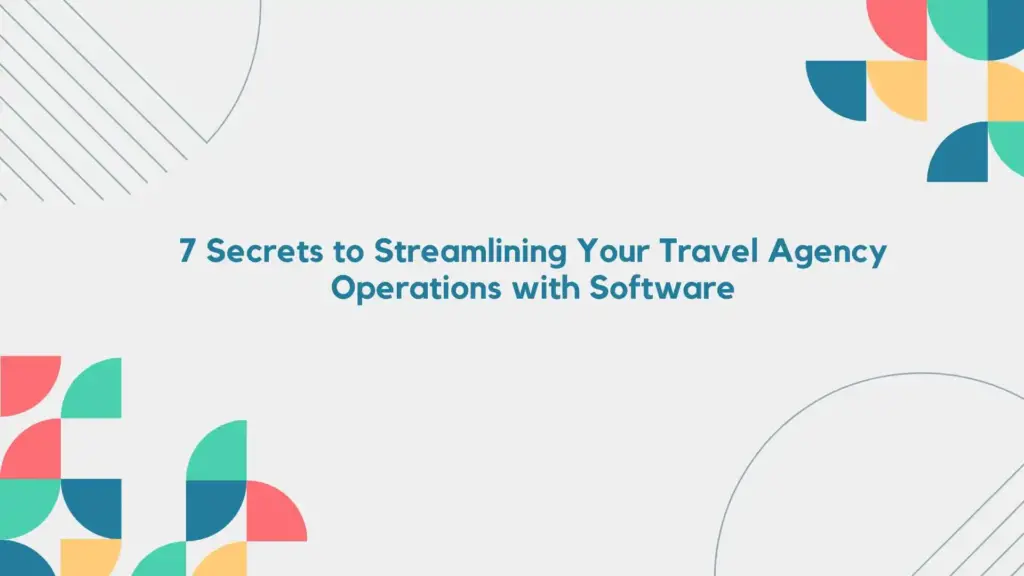
In today’s competitive landscape, efficiency is not just an option but a necessity for travel agencies. By embracing software solutions, agencies can automate repetitive tasks, optimize processes, and focus more on delivering exceptional service to clients.
Gone are the days of manual data entry and paperwork. By utilizing software solutions tailored for the travel industry, agencies can automate administrative tasks such as booking confirmations, itinerary generation, and document processing, saving valuable time and resources.
With the right software tools, travel agencies can streamline booking processes from start to finish. From initial inquiries to final reservations, automation ensures accuracy, efficiency, and a seamless experience for both agents and clients.
Software platforms equipped with advanced algorithms can analyze customer preferences and behavior to create personalized travel itineraries. By offering tailored recommendations and experiences, agencies can exceed customer expectations and foster long-term loyalty.
Effective communication is the cornerstone of exceptional customer service. By leveraging software solutions with integrated communication channels such as chatbots, emails, and mobile apps, agencies can provide timely assistance and support throughout the travel journey.
Data is a goldmine of insights waiting to be explored. By harnessing the power of data analytics, travel agencies can identify emerging trends, anticipate customer needs, and tailor their offerings accordingly, staying ahead of the competition.
With access to comprehensive data analytics, agencies can gain a deeper understanding of customer preferences, booking patterns, and destination trends. Armed with this knowledge, they can curate targeted promotions and packages, maximizing revenue and client satisfaction.
Security and convenience are paramount when it comes to online payments. By integrating secure payment gateways into their software platforms, travel agencies can offer clients a seamless and hassle-free booking experience while ensuring the safety of their financial information.
Manual invoicing can be time-consuming and prone to errors. By automating invoicing processes through software solutions, agencies can generate accurate invoices, track payments, and manage accounts receivable more efficiently, freeing up valuable time for other tasks.
Staying compliant with industry regulations is non-negotiable for travel agencies. By leveraging software solutions equipped with automated compliance checks, agencies can ensure adherence to legal requirements, minimizing the risk of fines or penalties.
The travel industry is constantly evolving, with new regulations and standards emerging regularly. With software solutions that offer real-time updates and compliance monitoring, agencies can stay informed and adapt swiftly to changes, maintaining their reputation and credibility
Customer relationship management (CRM) is essential for building lasting connections and fostering loyalty. By implementing CRM software tailored for the travel industry, agencies can centralize customer data, track interactions, and personalize communication, enhancing the overall customer experience.
Understanding customer preferences and behavior is key to delivering personalized service. With CRM solutions that capture and analyze customer interactions across various touchpoints, agencies can gain valuable insights into individual preferences, allowing for targeted marketing and service offerings.
Efficient inventory management is crucial for ensuring availability and optimizing resources. By utilizing software solutions with real-time inventory tracking capabilities, travel agencies can monitor stock levels, manage allocations, and make informed decisions to maximize revenue and minimize wastage.
Manual inventory replenishment can be time-consuming and prone to errors. By automating replenishment processes through software solutions, agencies can streamline procurement, optimize stock levels, and ensure timely availability of products and services, enhancing operational efficiency.
n today’s dynamic landscape, travel agencies must embrace technology to stay competitive and deliver exceptional service. By implementing software solutions tailored for the industry, agencies can streamline operations, enhance customer satisfaction, and position themselves for long-term success.
Software automation can streamline repetitive tasks, optimize processes, and improve overall efficiency, allowing your agency to focus more on delivering exceptional service to clients.
While there may be some initial challenges in adapting to new software, the long-term benefits far outweigh the risks. With proper training and support, your team can harness the full potential of software solutions to enhance productivity and customer satisfaction.
It’s essential to choose reputable software providers with robust security measures in place. Additionally, implementing encryption protocols, access controls, and regular security audits can help safeguard sensitive data and protect your agency from cyber threats.
While software can automate many tasks, human agents play a vital role in delivering personalized service and handling complex inquiries. By leveraging technology to augment human capabilities, travel agencies can achieve the perfect balance between efficiency and personalization.
Regular software updates are essential to ensure optimal performance, security, and compatibility with evolving industry standards. It’s recommended to stay abreast of new releases and patches provided by your software vendors and implement updates promptly.
Absolutely! With data analytics capabilities, software solutions can analyze customer trends, preferences, and feedback to tailor offerings and marketing strategies accordingly. By staying agile and responsive to customer needs, your agency can maintain a competitive edge in the market.
Explore the latest trends and predictions in travel agency management software. Discover how technology is shaping the future of travel agencies and enhancing their operations.
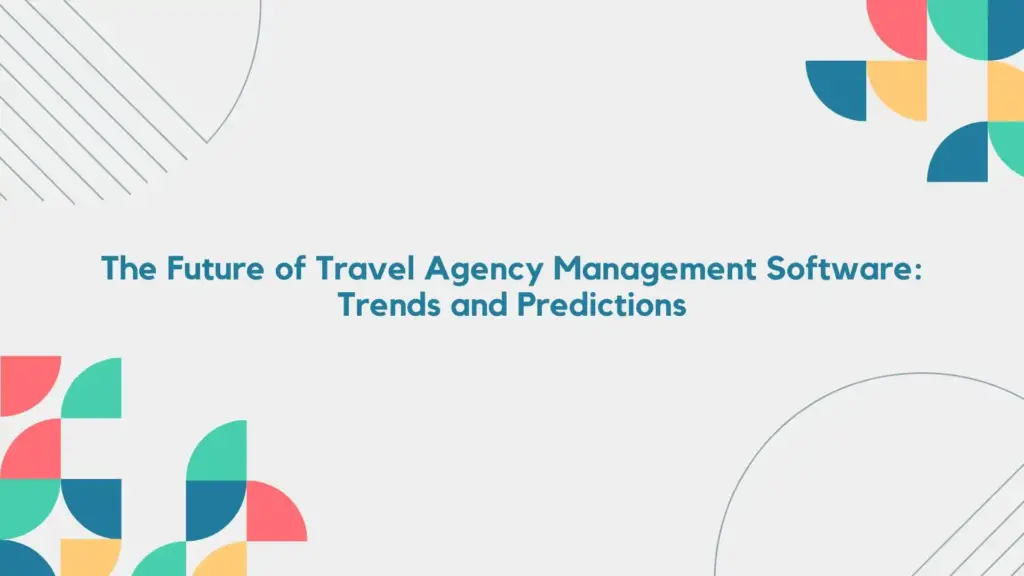
In today’s fast-paced world, the travel industry is constantly evolving, driven by technological advancements and changing consumer preferences. Travel agencies, in particular, are embracing innovative management software to streamline their operations and provide enhanced services to clients. In this article, we delve into the future of travel agency management software, exploring emerging trends and making predictions about the direction in which the industry is headed.
Automation is revolutionizing the way travel agencies operate, allowing them to automate repetitive tasks and focus on delivering personalized experiences to clients. With advancements in artificial intelligence and machine learning, travel agency management software can now analyze data, predict customer preferences, and suggest tailored travel itineraries. This not only saves time but also enables agencies to offer more personalized services, ultimately enhancing customer satisfaction.
Big data analytics play a crucial role in shaping the future of travel agency management software. By analyzing vast amounts of data collected from various sources, including social media, online reviews, and past booking history, travel agencies can gain valuable insights into customer behavior and preferences. This enables them to create targeted marketing campaigns, recommend personalized travel experiences, and anticipate future trends, thereby staying ahead of the competition.
Security is a top priority for travel agencies, given the sensitive nature of the information they handle, including payment details and personal identification. Blockchain technology offers a decentralized and secure way to store and manage data, reducing the risk of data breaches and fraud. By integrating blockchain into their management software, travel agencies can ensure the integrity and security of customer information, thereby building trust and confidence among clients.
With the widespread use of smartphones and tablets, travelers increasingly prefer to book their trips on the go. As such, travel agency management software must prioritize mobile accessibility, offering seamless experiences across all devices. Mobile-friendly interfaces, intuitive navigation, and instant booking capabilities are essential features that enable travelers to plan and book their trips conveniently from anywhere, at any time.
Cloud technology has revolutionized the way businesses manage their operations, and travel agencies are no exception. Cloud-based travel agency management software offers scalability, flexibility, and accessibility, allowing agencies to streamline their operations, collaborate more effectively, and adapt to changing market dynamics. With data stored securely in the cloud, agencies can access real-time information, optimize resources, and deliver exceptional customer service.
As we look ahead, several trends are poised to shape the future of travel agency management software:
Artificial Intelligence and Machine Learning: AI and ML will continue to play a significant role in automating processes, personalizing experiences, and predicting customer behavior.
Augmented Reality and Virtual Reality: AR and VR technologies will revolutionize the way travelers explore destinations and plan their trips, offering immersive experiences and virtual tours.
Voice Search and Natural Language Processing: Voice-enabled interfaces and NLP will make it easier for travelers to search for information, make inquiries, and book their trips using natural language commands.
Hyper-Personalization: Travel agencies will leverage data analytics to offer hyper-personalized travel experiences, catering to the unique preferences and interests of individual travelers.
Sustainability and Eco-Friendly Practices: With growing concerns about climate change, travelers are increasingly seeking eco-friendly and sustainable travel options. Travel agency management software will integrate features that promote responsible travel and support sustainable practices.
Cybersecurity and Data Privacy: As cyber threats continue to evolve, travel agencies will invest in robust cybersecurity measures to protect customer data and ensure compliance with data privacy regulations.
Artificial intelligence will automate tasks, personalize experiences, and enhance predictive capabilities, leading to more efficient and tailored services for travelers.
Blockchain technology offers decentralized and secure data storage, reducing the risk of data breaches and fraud, thereby enhancing trust and confidence among clients.
By analyzing vast amounts of data, travel agencies can gain valuable insights into customer behavior and preferences, enabling them to create targeted marketing campaigns, recommend personalized travel experiences, and anticipate future trends.
With the increasing use of smartphones and tablets, travelers expect to book their trips conveniently on the go. Mobile-friendly interfaces and instant booking capabilities are essential features that enable agencies to meet the needs of modern traveler
Emerging trends include AI and machine learning, augmented reality and virtual reality, voice search and natural language processing, hyper-personalization, sustainability, and cybersecurity
Travel agencies must embrace technological innovations, prioritize personalized experiences, and adopt sustainable practices to stay competitive in the evolving travel industry landscape.
The future of travel agency management software is bright, with advancements in technology driving innovation and transformation across the industry. By embracing automation, leveraging big data analytics, integrating blockchain technology, and prioritizing mobile accessibility, travel agencies can streamline their operations, personalize experiences, and stay ahead of the curve. As emerging trends continue to shape the landscape, the key to success lies in embracing change, staying agile, and delivering exceptional value to travelers.
Looking for the ultimate comparison between on-premise and cloud-based travel agency management software? Dive into this comprehensive guide to make an informed decision for your travel business
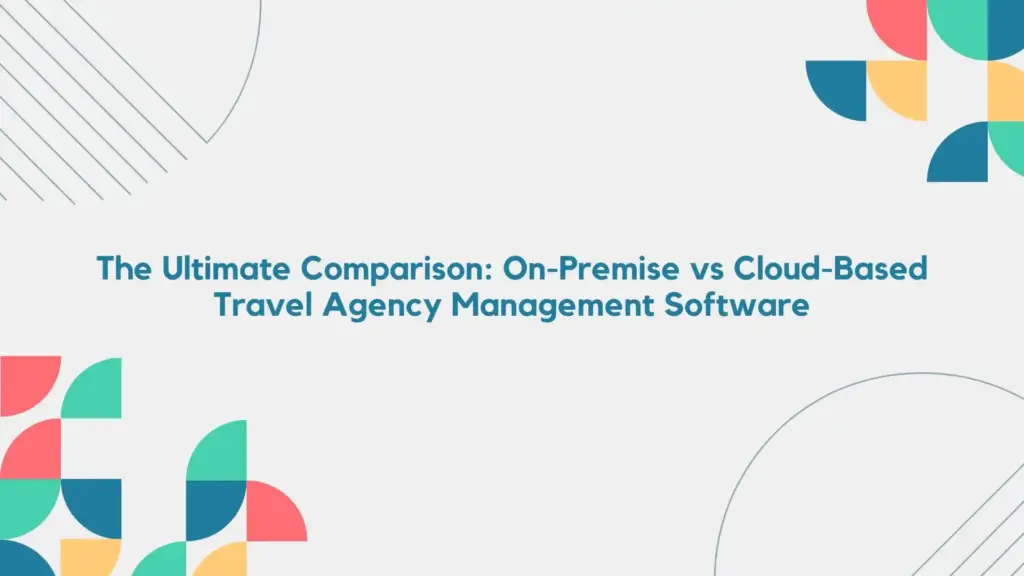
In the fast-paced world of travel agency management, choosing the right software solution is paramount. In this article, we’ll explore the ultimate comparison between on-premise and cloud-based travel agency management software. Whether you’re a seasoned travel agent or just starting out, understanding the nuances of these two systems can make all the difference in streamlining your operations, enhancing customer experience, and ultimately, boosting your bottom line.
On-premise travel agency management software offers a sense of control and security. With this system, all data and applications are stored locally on your company’s servers, giving you complete autonomy over your operations. Additionally, on-premise solutions typically allow for extensive customization to tailor the software to your specific needs.
Despite its advantages, on-premise software comes with its share of drawbacks. Firstly, the initial setup costs can be substantial, as you’ll need to invest in hardware, infrastructure, and IT personnel to maintain the system. Moreover, updates and maintenance often require manual intervention, leading to potential downtime and operational disruptions.
Cloud-based travel agency management software offers unparalleled flexibility and scalability. By leveraging cloud technology, users can access the system from anywhere with an internet connection, making remote work and collaboration a breeze. Furthermore, cloud-based solutions typically operate on a subscription model, eliminating the need for hefty upfront investments and allowing for seamless scalability as your business grows.
While cloud-based software offers numerous benefits, it’s not without its limitations. One common concern is data security, as sensitive information is stored off-site on third-party servers. Additionally, reliance on internet connectivity means that downtime or network issues can impede access to vital resources, potentially disrupting day-to-day operations.
Scalability
Consider the long-term scalability of your chosen software solution. Will it be able to accommodate your growing business needs, or will you outgrow its capabilities?
Cost
Evaluate both the upfront costs and ongoing expenses associated with each option. While on-premise software may require a larger initial investment, cloud-based solutions often entail recurring subscription fees.
Security
Prioritize data security and compliance with industry regulations when selecting a software provider. Look for robust encryption protocols, regular security updates, and compliance certifications.
Accessibility
Assess the accessibility of the software for your team members. Can they easily access the system from multiple devices and locations, or are there limitations to consider?
Customization
Consider your agency’s unique workflows and processes. Does the software offer sufficient customization options to adapt to your specific requirements?
Support and Training
Evaluate the level of support and training provided by the software vendor. Will your team receive adequate assistance during the implementation process and beyond?
The main difference lies in where the software and data are hosted. On-premise software is installed and operated locally on the company’s hardware and servers, while cloud-based software is hosted on remote servers and accessed via the internet.
Cloud-based solutions typically involve lower upfront costs and predictable monthly fees, making them more cost-effective for many businesses, especially small to medium-sized agencies.
On-premise systems offer greater control over data security since the data is stored locally on the company’s servers. However, cloud-based systems often employ advanced security measures and encryption protocols to safeguard sensitive information.
Yes, both types of software offer varying degrees of customization. On-premise solutions may provide more extensive customization options, but many cloud-based providers offer configurable features to tailor the software to your specific requirements.
In the event of an internet outage, access to cloud-based software may be temporarily disrupted. However, many providers offer offline functionality or mobile apps to mitigate downtime and ensure continuity of operations.
With on-premise software, updates and maintenance are typically performed manually by the company’s IT staff, which may require scheduled downtime. In contrast, cloud-based solutions are updated automatically by the provider, often with minimal disruption to users.
In conclusion, the choice between on-premise and cloud-based travel agency management software ultimately depends on your agency’s unique needs, budget, and long-term goals. By carefully weighing the pros and cons of each option and considering key factors such as scalability, cost, security, and accessibility, you can make an informed decision that propels your business forward in the digital age.
Discover how scalable travel agency management software solutions can revolutionize your business operations and drive growth. Learn about the benefits, features, and implementation strategies to scale your travel agency efficiently.
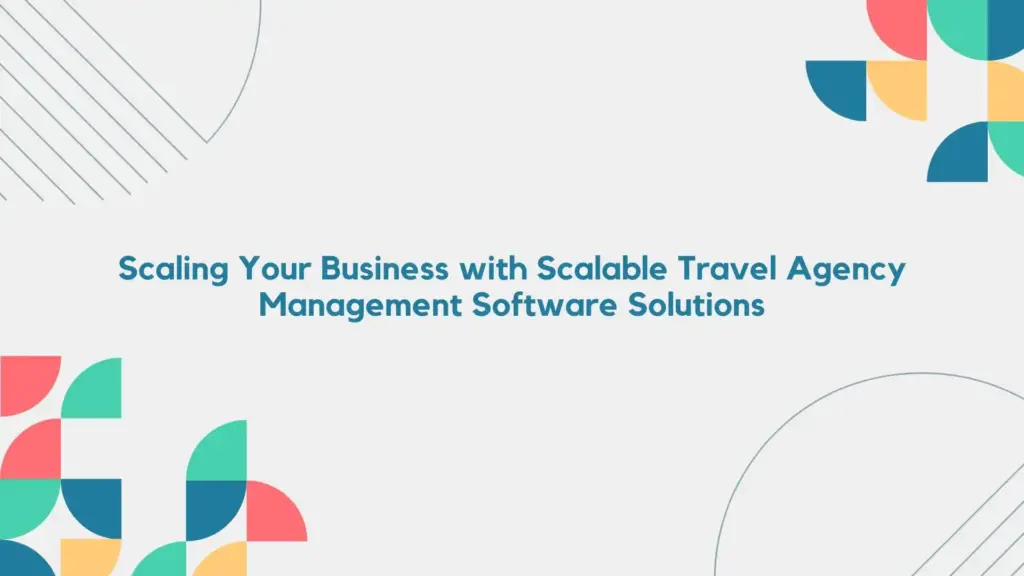
In today’s dynamic travel industry, scaling your business requires more than just ambition; it demands strategic utilization of cutting-edge technology. This article explores how scalable travel agency management software solutions can empower travel agencies to streamline operations, enhance customer experiences, and achieve sustainable growth. From optimizing workflows to leveraging data analytics, we delve into the myriad benefits and implementation strategies of these innovative solutions.
Traditional travel agency management systems often struggle to keep pace with the evolving demands of the industry. Legacy software may lack the flexibility and scalability required to adapt to changing market dynamics, hindering business growth and efficiency.
Scalable travel agency management software solutions offer a flexible framework that can expand or contract in response to business needs. By accommodating growth without compromising performance, these solutions empower travel agencies to seize new opportunities and overcome operational challenges.
Efficient inventory management lies at the heart of a successful travel agency. Scalable software solutions offer dynamic inventory management capabilities, allowing agencies to easily add or update travel products and services in real-time.
Streamlining the booking process is essential for enhancing customer satisfaction and driving sales. Scalable travel agency management software integrates with multiple booking systems, enabling seamless reservation management across various platforms.
Data-driven insights are invaluable for making informed business decisions and optimizing performance. Scalable software solutions provide customizable reporting and analytics tools that empower travel agencies to track key metrics, identify trends, and capitalize on growth opportunities.
By automating routine tasks and centralizing operations, scalable software solutions minimize manual effort and reduce the risk of errors. This efficiency boost allows travel agencies to focus on delivering exceptional service and cultivating customer relationships.
Personalized experiences are paramount in the travel industry, where customers seek tailored recommendations and seamless interactions. Scalable software solutions enable travel agencies to deliver personalized services, from targeted marketing campaigns to curated travel itineraries
The ability to scale operations in response to changing market conditions is crucial for long-term success. Scalable software solutions provide the flexibility and agility needed to expand into new markets, launch innovative services, and stay ahead of competitors.
Before selecting a scalable software solution, conduct a thorough needs assessment to identify your agency’s specific requirements and objectives. Consider factors such as scalability, integration capabilities, and user-friendliness.
Choose a scalable software solution that seamlessly integrates with your existing systems and processes. This integration ensures minimal disruption to your operations and facilitates a smooth transition to the new platform.
Invest in comprehensive training and ongoing support to maximize the benefits of your scalable software solution. Provide employees with the necessary tools and resources to effectively utilize the new system and address any challenges that may arise.
Implementing scalable travel agency management software solutions is not just about embracing new technology; it’s about future-proofing your business and positioning yourself for long-term success. By leveraging the power of scalable solutions, travel agencies can optimize operations, enhance customer experiences, and achieve sustainable growth in an increasingly competitive market landscape.
A: Scalable travel agency management software offers dynamic inventory management, integrated booking systems, and customizable reporting and analytics tools
A: Scalable solutions enhance operational efficiency, improve customer experiences, and provide the flexibility needed to adapt to changing market conditions.
A: Travel agencies should conduct a needs assessment, ensure seamless integration with existing systems, and invest in comprehensive training and support.
A: Yes, scalable software solutions are designed to expand or contract in response to business needs while maintaining optimal performance.
A: Scalable solutions enable travel agencies to streamline operations, deliver personalized experiences, and capitalize on growth opportunities, thereby staying ahead of competitors.
A: While initial investment may be required, scalable solutions offer long-term cost savings through improved efficiency and productivity.
Scaling your travel agency requires a strategic approach and the right technology partner. Scalable travel agency management software solutions offer a comprehensive suite of features and benefits designed to drive growth, enhance customer experiences, and ensure long-term success. By embracing scalability, travel agencies can navigate the complexities of the industry with confidence and achieve their full potential.